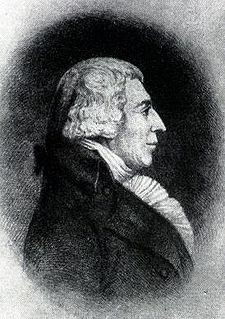
Richard Dobbs Spaight was an American politician, planter, and signer of the United States Constitution, who served as a Democratic-Republican U.S. Representative for North Carolina's 10th congressional district from 1798 to 1801. Spaight previously served as the eighth governor of North Carolina from 1792 to 1795. He ran for the North Carolina State Senate in 1802, and Federalist U.S. Congressman John Stanly campaigned against him as unworthy. Taking offense, Stanly challenged him to a duel on September 5, 1802, in which Stanly shot and mortally wounded Spaight, who died the following day.

The 1984 United States House of Representatives elections was an election for the United States House of Representatives in 1984 which coincided with the re-election of President Ronald Reagan in a landslide. This victory also yielded gains for Reagan's Republican Party in the House, where they picked up a net of sixteen seats from the Democratic Party. Despite Reagan's extremely large electoral victory, the Democrats nonetheless retained a commanding majority in the House and gained seats in the Senate. These elections were the last until 2020 when a member of a political party other than the Democrats, Republicans, or an Independent had one or more seats in the chamber.

North Carolina's 3rd congressional district is located on the Atlantic coast of North Carolina. It covers the Outer Banks and the counties adjacent to the Pamlico Sound.

The United States House of Representative elections of 1998 in North Carolina were held on 3 November 1998 as part of the biennial election to the United States House of Representatives. All twelve seats in North Carolina, and 435 nationwide, were elected.

The United States House of Representative elections of 2000 in North Carolina were held on 3 November 2000 as part of the biennial election to the United States House of Representatives. All twelve seats in North Carolina, and 435 nationwide, were elected.

The United States House of Representative elections of 1996 in North Carolina were held on 5 November 1996 as part of the biennial election to the United States House of Representatives. All twelve seats in North Carolina, and 435 nationwide, were elected.

The 2014 United States Senate election in North Carolina took place on November 4, 2014, to elect a member of the United States Senate to represent the state of North Carolina, concurrently with other elections to the United States Senate in other states and elections to the United States House of Representatives and various state and local elections. On May 6, 2014, the primary took place.

Due to the cession of North Carolina's trans-Appalachian territory to form the Southwest Territory, the territory of the old 5th district was lost. North Carolina retained the same number of Representatives, and so it redistricted for the Second Congress.

North Carolina elected its members August 14, 1817.

North Carolina gained one representative as a result of the Census of 1810. Its elections were held April 30, 1813, after the term began but before Congress's first meeting.

On December 15, 1815, having been elected to the Senate, Nathaniel Macon (DR) of North Carolina's 6th district resigned. To fill the vacancy left in North Carolina's representation for the 14th Congress, a special election was held on January 22, 1816.

On January 1, 1818, a special election was held in North Carolina's 7th district to fill a vacancy left by the death of Representative-elect Alexander McMillan (F) before the 15th Congress had assembled.

North Carolina elected its members August 9, 1827, after the term began but before the new Congress convened.

North Carolina elected its members August 13, 1829 after the term began but before Congress convened.

This is a list of elections in the U.S. state of North Carolina.

The 1876 United States presidential election in North Carolina took place on November 7, 1876, as part of the 1876 United States presidential election. North Carolina voters chose 10 representatives, or electors, to the Electoral College, who voted for the president and vice president.

The 2022 United States Senate election in North Carolina will be held on November 8, 2022, to elect a member of the United States Senate to represent the State of North Carolina.
This page is based on this
Wikipedia article Text is available under the
CC BY-SA 4.0 license; additional terms may apply.
Images, videos and audio are available under their respective licenses.





